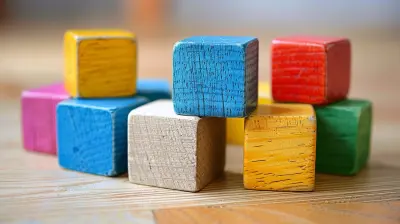23 July 2025
We’ve all been there—making mistakes, facing setbacks, and feeling frustrated. But have you ever stopped to think that mistakes are actually golden opportunities? They might sting in the moment, but if you embrace them, they can become your most powerful teachers.
Too often, mistakes are seen as failures, when in reality, they are stepping stones toward success. Whether you're a student trying to master a subject, a professional honing your skills, or just someone striving for personal growth, reviewing your mistakes is key to strengthening your understanding. Let’s dive into why mistakes matter and how they can help you grow.

Why Mistakes Are a Blessing in Disguise
Mistakes aren’t signs of failure; they’re proof that you're trying. If you never mess up, you’re probably not pushing yourself hard enough. In fact, some of the most brilliant minds in history—think Albert Einstein and Thomas Edison—failed countless times before achieving success.So, why should you embrace mistakes instead of fearing them?
- They highlight gaps in knowledge: Mistakes show us what we don’t know and where we need improvement.
- They build resilience: Every time you bounce back from a mistake, you become mentally stronger.
- They encourage deeper learning: When you review and correct errors, you reinforce concepts and make learning stick.
- They foster innovation: Some of the world's greatest discoveries were accidents—think of penicillin or even the microwave!

The Psychology Behind Learning from Mistakes
Our brains are wired to remember mistakes more vividly than successes. Have you ever noticed how messing up on a test question or mispronouncing a word in public makes it stick in your memory? That’s because errors create strong neural connections, which, when corrected, help reinforce learning.When you review your mistakes, your brain actively works to understand what went wrong and find a solution. This process strengthens neural pathways, making sure you don’t repeat the same error in the future. In other words, mistakes make learning deeper and more meaningful.

How Reviewing Mistakes Improves Understanding
1. Identifies Patterns of Weakness
Looking back on mistakes can reveal patterns. Maybe you always struggle with a particular math formula or forget historical dates. Recognizing these weaknesses allows you to focus your efforts where they’re needed most.2. Encourages Critical Thinking
When you take time to analyze what went wrong, you engage in critical thinking. Instead of passively accepting failure, you ask yourself:- Why did I make this mistake?
- What can I do differently next time?
- How can I ensure I remember this information better?
By actively questioning your mistakes, you develop problem-solving skills that go beyond just fixing errors—they make you a better thinker.
3. Boosts Confidence in the Long Run
Ironically, making and correcting mistakes can actually increase confidence. Why? Because when you understand why you went wrong and take steps to correct it, you feel more prepared and assured in your abilities. The next time you face a similar challenge, you’ll remember what not to do, and that makes all the difference.4. Strengthens Memory Retention
Studies show that learning from mistakes enhances memory retention. Think about it—when you get an answer wrong and then correct it, you're much more likely to remember the right answer than if you'd gotten it right the first time. That’s because your brain links the mistake to the correction, creating a stronger recall mechanism.5. Develops a Growth Mindset
Renowned psychologist Carol Dweck talks about the concept of a growth mindset—believing that abilities and intelligence can be developed through effort and learning. Those with a fixed mindset avoid challenges because they fear failure. On the other hand, those with a growth mindset see mistakes as opportunities for improvement.By reviewing and learning from mistakes, you train yourself to embrace challenges and develop resilience, ultimately fostering a mindset that leads to success.

Steps to Effectively Review and Learn from Mistakes
Alright, so we've established that mistakes are incredibly valuable. But how exactly should you go about reviewing them? Here’s a step-by-step guide:1. Acknowledge the Mistake Without Self-Judgment
The first step is to accept that mistakes happen. Avoid negative self-talk like “I’m so bad at this” or “I’ll never be good enough.” Instead, reframe it as “This is a learning opportunity.”2. Analyze What Went Wrong
Take a closer look at the mistake:- Was it a lack of understanding?
- Did you misread the question or instructions?
- Were you rushing and made a careless error?
Understanding the root cause helps you take corrective action more effectively.
3. Seek Feedback if Necessary
If you’re unsure why you made a mistake, don’t hesitate to ask for help. Whether it's a teacher, a mentor, or even an online resource, getting clarity can provide insights you might have missed.4. Correct the Mistake and Reinforce Learning
Simply identifying the mistake isn’t enough—you need to actively correct it. Rewrite the correct answer, practice similar problems, or explain the concept to someone else. The more you engage with the correction, the better you'll remember it.5. Reflect on the Lesson Learned
Take a moment to reflect on what the mistake taught you. Ask yourself:- What did I learn from this?
- How can I prevent this mistake in the future?
The more intentional you are in this process, the stronger your understanding will become.
6. Apply the Learning Moving Forward
Mistakes should not just be corrected and forgotten—they should be used as learning experiences. Apply the lessons you've learned to future challenges and watch how your skills improve over time.Turning Setbacks into Success Stories
Every setback is a setup for a comeback. The most successful people in the world didn’t get there by avoiding mistakes—they got there by learning from them.- Michael Jordan was cut from his high school basketball team before becoming an NBA legend.
- J.K. Rowling received multiple rejections before Harry Potter became a global phenomenon.
- Steve Jobs faced failure before revolutionizing technology with Apple.
The common thread? They embraced their mistakes, learned from them, and kept moving forward.
You can do the same. Instead of fearing mistakes, use them as stepping stones toward growth and success.
Final Thoughts
Mistakes are not roadblocks—they are detours guiding you toward deeper understanding and mastery. Instead of shying away from them, lean in, analyze, and grow. The more you review your mistakes, the stronger your foundation of knowledge becomes.So the next time you stumble, remember: that mistake isn't the end of the road—it's just a new opportunity to learn and improve. Keep going, keep learning, and most importantly, keep believing in yourself.









Franklin Kirk
Embracing our mistakes is the key to true growth and understanding. Each error is not a setback but an invaluable lesson on the path to mastery. Let’s transform our missteps into milestones, fueling our journey with resilience and insight. Review, learn, and rise stronger!
December 27, 2025 at 12:16 PM